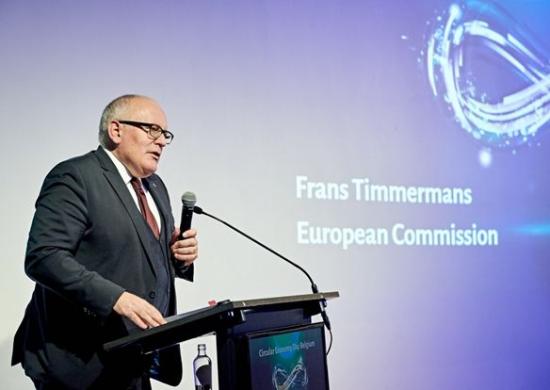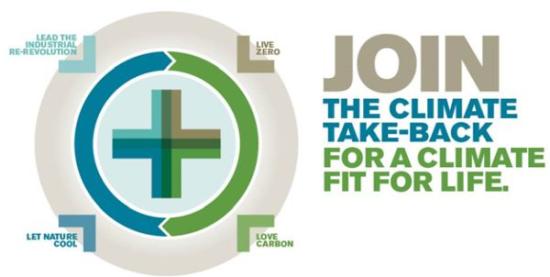Policy-makers, companies, NGOs ... the whole of society agrees that we need to make material cycles circular, invest in life cycle extension, regeneration, sharing systems, etc. On the Day of Circular Economy it became clear once again that the industry plays an essential role. Interface is now accepting the challenge.
It is important that an ever-growing group of people sees the link between the circular economy and the transition to further democratisation and expansion of renewable energy sources. PV installations, wind power,... each require specific materials, with their complexities for production, use and product disposal.
Frans Timmermans, first vice-president of the European Commission, uttered a beautiful message on the Day of the Circular Economy on 21 November 2017: “the industry - with the support of knowledge institutions - is in the lead when it comes to circular economy. Companies are less afraid than policy-makers to think in the longer term and are now taking the lead in putting the circular economy into practice.” That’s quite a boost for everyone who is actively involved in setting up the circular economy, because all too often people just randomly assume that companies are only making products that break more easily. While there are so many examples in the technological industry which prove the opposite.
More so, an increasing number of companies are in favour of making binding agreements for the implementation of the climate agreement and want clearly enforceable rules for circular products and services. In December 2017 more than fifty large companies from the G20 countries (the main industrialised countries) released a declaration in which they called for the implementation of the Paris climate agreement. People who signed the declaration include famous names such as Arcadis, Philips and H&M.
Theory will be put into practice at Interface
Interface provides a strong example subscribing the statement of Frans Timmermans by means of a rather bald vision. Change has always been important in Interface’s corporate philosophy. In the 1990s founder Ray Anderson was already aware that the take-make-waste model was no longer tenable, and that the company had to aim for a circular model. This meant that a petrol-intensive carpet factory had to change drastically to become an eco-friendly, sustainable and, ultimately, a regenerating company. The different ambitions were initially joined in ‘Mission Zero’, a promise to eliminate every negative impact of the company on the environment before 2020, which resulted in a drastic change of operations, products and the overall way of doing business.
The manufacturer of floor coverings now wants to contribute to a better world with his new strategy and changes his tactics from a restoring approach to a regenerating approach; after doing less evil (less waste, emissions ...) and doing well (using recycling, no emissions, low carbon products ...) it is now time for improving the living environment (factories like forests, products from a variety of materials, products storing carbon ...). Their Climate Take Back initiative is based on the premises ‘If humanity has changed the climate by mistake, can we change it with intent?’ It is supported by four pillars:
- Love Carbon: it is time we start using carbon as a resource and see and use its worth.
- Let Nature Cool – help nature without interference.
- Lead the industrial re-evolution: work with nature, not against it.
- Live zero: do not contribute to the problem, contribute to the solution.
No one can do so alone, though, cooperation and innovation are required: co-innovation is an important pillar in creating sustainable value. It is a way of making progress together and achieve goals through methods that connect ideas, people and resources and sets aside barriers.
The Interface approach are completely in line with the principles of circular economy, as also appears from the following article:
- Systems thinking: factories running like forests, which means that the ecosystem services are provided by the environment, such as water storage and treatment, carbon storage, the nitrogen cycle, lower temperatures and safeguarding of living areas of wild animals. And this at the same levels as was available before humans came into the picture.
- Innovation: this is, according to Interface, what business activities have to result in - a systematic approach which does not only work to improve products and processes, but also to integrate innovation and social efforts in the fabric of the company. Interface hopes it will inspire other companies to do the same and join in.
- Stewardship: the way companies think has changed over the last couple of years in terms of what it means to be a sustainable company. The intellectual transformation goes beyond a zero footprint or inflicting less damage, and involves searching ways to have a real positive impact with activities and products and thus become a real instrument for change.
- Cooperation: in some ways Interface is well on its way to surpass the previous objective from ‘Mission Zero’. One example is Net-Works, which was launched in 2012 and is dedicated to convert fishing nets that are no longer useful in the poorest areas of the world in a raw material for nylon carpets.
- Value optimisation: everything comes from a green factory, a fact which really helps sales talks go in the right direction. When a customer doubts between two solutions and one of the two products is made in a green factory, the choice becomes easier.
- Transparency: the company does not only want its transformation to be real and serious, it also wants to be considered responsible for it. It also wants to verify and measure the success. It is thinking about a method to do this. This is still pioneering work and therefore entails some risk, which Interface is prepared to take.
Do you want to find out more about the company’s approach? Look behind the scenes of the Interface animated film here:
Do you want to find out why the circular economy can be an added value for your company? Download the whitepaper which we recently wrote and published, including besides the Interface case several other examples of companies that took concrete actions. No one wants the world to be worse off, right?
(Source figures : Interface)






